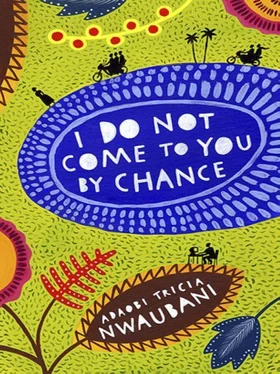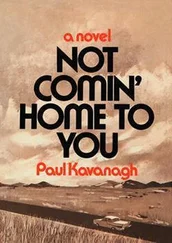I remembered when Charity was born about eight weeks before my mother’s expected date of delivery. Though we were all pleased that it was a girl at last, she looked like a withered skeleton, tiny enough to make seasoned doctors squirm. Going to hospital almost every day and watching her suffer must have been when each of us developed a special fondness for her. All of us except Eugene, who was a year younger than Godfrey and a year older than Charity. He was a thorn in her flesh and made her a regular target for his silly jokes.
‘Ah!’ Eugene exclaimed now. ‘Look at your armpit! It looks like a gorilla’s thighs!’
Everybody turned towards Charity. She clutched her arms close to her sides and looked about to press the control buttons of a time machine and disappear. My mother’s eyes swelled with shock.
‘Why can’t you shave your armpits regularly?’ she asked. ‘Don’t you know you’re now a big girl?’
A cloud fell upon Charity’s face. At fifteen and a half, she was still very much a baby. She had wept when Princess Diana died, sobbed when we watched a documentary about people whose body parts were enlarged because of elephantiasis. While other Nigerians poured into the streets and celebrated General Sani Abacha’s sudden death, Charity stayed indoors and shed tears.
‘Is there any law that says she must shave?’ Godfrey intervened. ‘Even if there is, who makes all those laws? Whose business is it if she decides to grow a forest under her arms?’
Charity rubbed her eyes.
‘It looks dirty,’ my mother said. ‘People will think she’s untidy.’
‘Why can’t people mind their own business?’ Godfrey replied. ‘Why should they go about inspecting other people’s armpits? After all, those hairs must have been put there for a reason.’
Charity sniffed.
‘Actually, you’re right,’ I added. Not that I agreed that any girl should go about with a timberland under her arms, but for the sole purpose of coming to my darling sister’s aid in this her hour of need. ‘Scientists say that the hairs there are meant to transmit pheromones.’
‘What are pheromones?’ Eugene asked.
‘They are secretions that men and women have without being aware of it,’ my father explained. ‘They play a part in the attraction between men and women.’
That was one thing that sickness and poverty had not been able to snatch from him. My father was a walking encyclopedia, and he flipped his pages with the zeal and precision of a magician. He knew every theory of science and every city in the atlas; he knew every word in the dictionary and every scripture in the Holy Bible. It was such a pity that all the things he knew were not able to put money in his pocket.
‘No wonder,’ Eugene said seriously. ‘Like that houseboy on the third floor who’s always staring at her whenever she’s walking back from school. I guess it’s not really her fault the sort of people her own pheromones attract.’
He laughed and choked at his own joke while the rest of us stifled our amusement for the sake of solidarity with Charity. All of us but one. My father transmitted an icy frown that froze the dancing muscles on Eugene ’s face. We all looked back to our plates. I realised that mine was empty. It was little episodes like this that made it easier for me to forget just how much like sawdust our meals tasted.
Being careful not to disturb Godfrey slumbering beside me, I crawled out of bed and changed into a pair of trousers and T-shirt. Breath stale and hair as dishevelled as a cheap barrister’s wig, I made my way out to the kitchen, which served as the route for most of the traffic in and out of our house. The front door was reserved for special visitors. People like my father’s sisters and my secondary school principal.
‘Bro. Kingsley, good morning,’ Odinkemmelu and Chikaodinaka said.
They always woke early to begin their chores.
‘Bro. Kingsley, are you go far away or should we kept your breakfast for you by the time you came back?’ Odinkemmelu asked.
It was not the boy’s fault that his tenses were firing bullets all over the place. Before he came to live with us about two years ago, Odinkemmelu had never set foot outside the village and the only English he knew was ‘I want eat.’ Over time, his vocabulary had improved. But when it came to tenses, he was never quite sure whether he was standing in the present or dwelling in the past.
Although his position on the family tree could not be described in anything less than seven sentences, Odinkemmelu was introduced to us as our cousin. Chikaodinaka was a more clearly identified relative. She was my father’s cousin’s niece. Both Odinkemmelu and Chikaodinaka offered their services without pay. Their reward was in kind. Leaving the village and coming to stay with relatives in town was the only opportunity they might ever get to learn English, watch television, live in a house with electricity, use a toilet that had a water system, or learn a trade.
‘I’m just going to the post office,’ I replied. ‘I’ll eat when I get back.’
I stepped out into the young morning and walked briskly with my heart playing sweet music. This could be the day that changed my life. For the first few minutes, the only sound that disrupted the early morning calm was the dance steps of dry leaves and debris in the Harmattan breeze. Gradually, a new sound joined in.
‘Come and receive divine intervention! For nothing is impossible with God!’
Ring! Ring!
‘Come and receive a touch from God! Our God is a God of miracles!’
Ring! Ring!
Soon, I bumped into a group of young men and women dressed in white T-shirts and black bottoms. Their T-shirts were imprinted with some verse of scripture or the other; they were clapping and dancing and chanting Christian choruses. Most of them jangled tambourines. One blared into a loudspeaker.
‘Come and receive a touch from God!’ he announced. ‘Your life will never remain the same again!’
I was familiar with this sort of ‘Morning Cry’ from my university days. Early in the morning, before others had woken up, some students would take strategic positions along hostel corridors from where they would shout out the gospel of Jesus Christ. Often, groggy students yelled angry abuses at them.
‘Get out of that place and allow us sleep!’
‘God punish all of you preachers!’
‘Ohhhhhhhhhhh! You people should leave us alone! Please! Please! Please!’
Once, one of my roommates had gone as far as opening the door and throwing a cup of water into the face of a self-employed evangelist. The bearer-of-good-news merely turned the other cheek and continued with his ‘Morning Cry’. Now an ardent man moved in my direction to hand me a colourful flyer. I sidestepped him deftly and continued on my journey. The last thing I needed was to be harassed by religious fanatics.
The post office compound was as deserted as a school play-ground on Christmas Day. I walked straight to box 329 and inserted the key. There was a manila envelope with my name printed neatly on the surface. The butterflies in my stomach began a vigorous gyration. I dragged out the thin, white sheet of paper and unfolded it with the panache of one who had performed this same action several times before. Right there and then, my heart stopped beating.
Dear Mr Kingsley O. Ibe,
RE: INTERVIEW FOR THE POSITION OF CHEMICAL ENGINEER (SHP06/06/9904)
We are sorry to inform you that you did not meet the requirements for-
There was no need to read further. I crumpled the offensive letter in my hand and shut my eyes tight. The wind ignored my grief and continued sucking the moisture from my skin as she hurried past on her journey from the Sahara to the Gulf of Guinea. I am not sure how long I stood there. Eventually, I regained consciousness and locked the box. I wanted to weep, to run, to hide away somewhere, never to see anyone again. Anyone except Ola. I wanted to see Ola at once.
Читать дальше





![Майкл Азеррад - Come as you are - история Nirvana, рассказанная Куртом Кобейном и записанная Майклом Азеррадом [litres]](/books/392533/majkl-azerrad-come-as-you-are-istoriya-nirvana-ra-thumb.webp)






